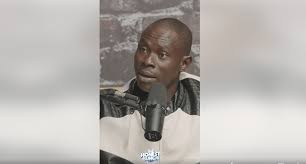Ghe Ghe’s appearance on the Honest Brunch podcast, hosted by Nedu Wazobia, sparked a heated discussion about the evolving dynamics of relationships and marriage in contemporary society, particularly within the Nigerian context. His central argument revolved around the perceived shift in the motivation for marriage, transitioning from a foundation of partnership and mutual support to a mechanism for women to elevate their socio-economic status. He portrayed marriage as a potential “trap” for men, burdened with the financial expectations of their partners, a stark contrast, in his view, to the collaborative partnerships of the past. This perspective sparked a lively exchange with Nedu, who challenged Ghe Ghe’s generalizations by referencing the enduring partnership of his own parents. However, Ghe Ghe maintained his position, arguing that the very fabric of marriage had undergone a fundamental transformation.
Ghe Ghe’s critique extended beyond the financial aspects of modern relationships, delving into the perceived materialism and sense of entitlement he observed among some women in the dating scene. He characterized dating in Nigeria as akin to a job interview, where men are scrutinized for their financial capacity rather than valued for their personal qualities. He expressed concern that these expectations transform relationships into transactional agreements, undermining the genuine connection and shared responsibility that should characterize a healthy partnership. While acknowledging the humorous undertones of his remarks, Ghe Ghe insisted on the seriousness of the underlying issue, emphasizing the societal pressures placed on men to bear the brunt of financial responsibilities within marriage. He sought to clarify that his critique was not aimed at all women, but rather at the prevailing societal norms that contribute to these problematic dynamics.
Central to Ghe Ghe’s argument is the nostalgic comparison between traditional marital roles and the perceived realities of contemporary relationships. He romanticized a bygone era where women were portrayed as pillars of domestic support, managing the household, contributing to agricultural activities, and nurturing the family, while men assumed leadership positions. This idealized image served as a stark contrast to his characterization of modern relationships, where he perceives a shift in the balance of power and responsibility, leading to an increased financial burden on men. He argued that the traditional partnership model, based on mutual support and clearly defined roles, has been eroded by modern expectations, resulting in a transactional approach to relationships.
The debate initiated by Ghe Ghe’s comments highlights the complex and often contentious discussions surrounding gender roles and expectations within relationships. His perspective reflects a broader societal anxiety about the changing dynamics between men and women, particularly in the context of marriage. His arguments, while provocative, tap into the anxieties felt by some men who feel pressured by societal expectations to be the primary financial providers in relationships. This perspective, however, overlooks the complexities of modern life, where both partners often contribute financially and share responsibilities in various ways.
Ghe Ghe’s critique, while focusing on the perceived financial burdens placed on men, indirectly touches upon the broader issue of gender inequality. While his arguments appear to place blame on individual women for embracing materialistic values, they also inadvertently reveal the limitations of a societal structure that often places undue pressure on men to be the sole financial providers. This expectation can be traced back to traditional gender roles that, while evolving, still influence societal perceptions and expectations. By framing the issue as a financial transaction, Ghe Ghe overlooks the potential for mutually supportive partnerships where both individuals contribute equally, both financially and emotionally, to the relationship.
Ultimately, Ghe Ghe’s controversial statements sparked a much-needed conversation about the evolving expectations and complexities of modern relationships. While his perspective may be considered by some as overly simplistic and generalizing, it nevertheless highlights the anxieties and uncertainties surrounding marriage in a rapidly changing social landscape. The debate provoked by his remarks underscores the importance of ongoing dialogue about gender roles, financial responsibilities, and the pursuit of genuine partnership in contemporary relationships. By acknowledging these concerns and engaging in open communication, we can move towards a more nuanced understanding of the challenges and opportunities present in modern relationships, paving the way for healthier, more equitable partnerships.


